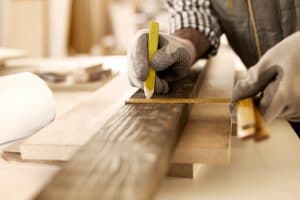We all have heard the importance of engaging in leisure and social activities among the retired—having a sense of purpose and belongingness is beneficial in all stages of life, but even more so for seniors when the desire to keep to oneself can be strong. The options can be limited, as we are all aware, but that doesn’t need to keep a willing person from finding an activity that can be fulfilling and life-enriching.
For those who are still weighing the choices, woodworking is one to consider for the benefits it could bring to the mind, the body, and one’s social circle. Although it is often thought of as a solitary endeavor, woodworking can be the center of an entire program that improves life for participants and gives senior woodworkers a chance to expand their social networks. As it relates to trends in senior living, a woodworking program can offer many benefits to the participants and to the community as a whole.
Benefits of woodworking for seniors

Communities that offer woodworking courses provide wins that go beyond students’ personal achievements, because crafting new pieces alongside each another can foster a stronger sense of connectedness. Creating new programs can be based off of personal achievements or goals, although there are still factors to be considered that are unique to a community and its residents.
Generally, efforts for the elderly can be measured similarly to how senior living facilities are assessed. For programs, success can be determined through these areas: the quality of life of individual participants, senior participation and inclusiveness of the activity, and the integration of a volunteer program.
The first category is already covered by studies, proving that woodworking gives threefold more than just enjoyment. In 2015, Mayo Clinic released the results of a research that followed more than 200 seniors and how they spent their leisure time. The major finding is this: Those who engaged in the arts and crafts in middle and old age significantly decreased their chances of developing cognitive disorders such as dementia four years down the line. The same could be said for those who maintained meaningful social connections.
Woodworking, which doubles as a low impact exercise, also affords one the benefits of being physically active. Carving for hours, even when seated comfortably, will cost one some calories and even use muscles that may need some flexing. The brain, an organ often treated as a muscle although it technically isn’t (just so we’re clear), can reap the rewards too as the activity challenges the mind. Even greater is its therapeutic side effect—in some cases, woodworking has helped those with mental health challenges such as PTSD to cope and have a greater sense of purpose in their everyday lives.
Although typically associated with men, woodworking can also be engaging for both sexes. Men often outnumber women in classes, but that does not keep women from showing excellence in the craft. It also shouldn’t discriminate between the professional and the hobbyist, so the success of such programs could be assessed by how inviting it is to seniors.
Challenging as that may sound, social inclusiveness within a woodworking program does not have to be complicated. It could be achieved by simply coming up with collective goals such as group projects and having an environment that encourages seniors to interact both in and out of class.
Facilities often depend on volunteers, so wood shops could also be assessed through their successful integration of a volunteer program, such as bringing in high school students to assist or learn as well, which would add an intergenerational element to the experience.
Finally, being handy is a useful, money-saving skill which makes woodworking an attractive hobby to take up early in life. Because of this, it is highly likely that there are already experienced woodworkers in a senior living community who could gain from feeling satisfaction over teaching what they’re good at. Meanwhile, those new to the hobby are not exempted from volunteering in some sort as part of a woodworking program. Others could also be enticed to take responsibility over other tasks such as ensuring safety in using tools and overseeing group projects.
Success stories and Kerby Centre
While woodworking is one of the recent trends in senior wellness, woodworking programs for the elderly are not entirely new. Carpentry classes have been mainstays for Kerby Centre in as early as the 1970s. Consequently, Kerby Centre was among the first to learn and eventually conduct successful wood shops. Eventually, what began as workshops soon evolved to be clubs that held regular meetings. The high level of involvement also meant that there was a steady flow of volunteers who assisted and even taught in the workshops.
Students found that what they did wasn’t just for their personal benefit. The wood creations of senior woodworkers from the Kerby Centre were also sold for fundraising efforts. Another Canadian organization and retirement center, the Trinity Village Studios, had participants work together to recreate the nativity scene for the holidays.
Even though safety could be an issue in woodworking, the advantages outweigh the opposite. Members benefited from having a reason to go out of the house and stay physically and mentally active through the activity. What’s more, there was a sense that one is doing something worthwhile—having the skill opened opportunities to contribute to the community and helped one feel more of active member of the society. Like other activities in senior living, one can see that woodworking ticks the boxes for a fulfilling option within a community setting. It’s up to the organizations at the forefront of the field to embrace it as they have with other trends in senior wellness.
—
To stay up-to-date on all the trends within the senior living field, click here to sign up for Love & Company’s Leaders’ Board newsletter. For a deeper dive into how these trends can impact your organization, call Tim Bracken at 410-207-0013.




